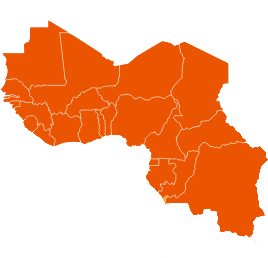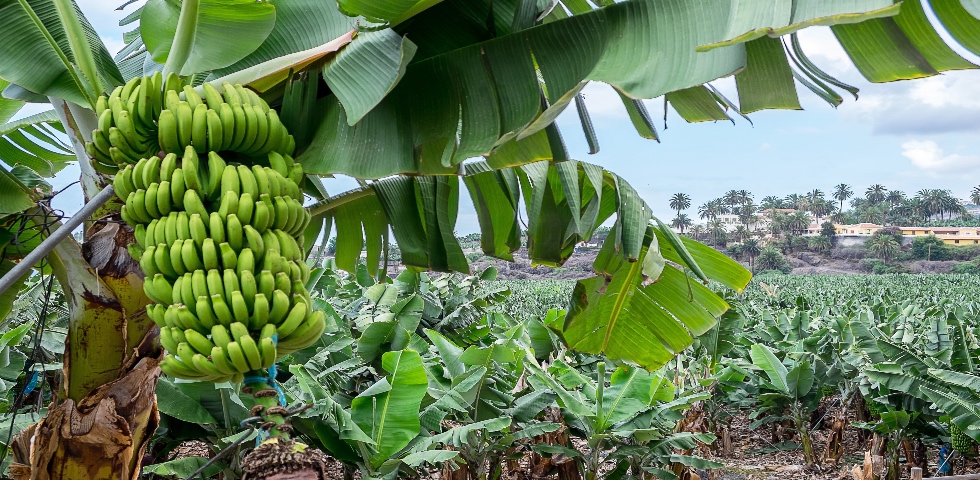Plantain seedlings
“I can produce plantains in the off season thanks to WAAPP [West Africa Agricultural Productivity Program] support. In the beginning, I was worried about demand. But thanks to a large media campaign, there is a large demand now. Sometimes, the demand is higher than what we supply.”
BACKGROUND
The challenge was the scarcity of disease-free plantain seedlings, making commercial scale production impractical experienced throughout the entire plantain and cocoa-farming belt in West Africa. The solution provided healthy planting materials, improved banana plantain yields and shortened the crop production cycle.
WHAT’S INVOLVED
- More than five million banana seedlings were planted, intercropped with cocoa trees.
- The beneficiaries are primarily the 108 nursery growers who were involved, as well as producers of plantain and cocoa.
- The seedlings produced were planted in the entire forest belt of Cote d’Ivoire and the West African subregion (Burkina Faso, Benin
EXPLORE THIS SOLUTION
The innovation works on three levels:
- The technology for producing the seedlings
- The development of a network of nurseries in close collaboration with the farmers
- The avoidance of transportation of seedlings with polythene bags, which saves money and is more environmentally friendly

Countries involved
Cote d’Ivoire, Burkina Faso, Benin, Togo
Project partners
National Centre for Agricultural Research (Centre National de Recherche Agronomique - CNRA), the Interprofessional Fund for Agricultural Research and Advice (Fonds Interprofessionnel pour la Recherche et le Conseil Agricoles - FIRCA); CORAF, the World Bank
Project dates
2013-2018
Share this solution
Bookmark this solution
BookmarkShow Full Solution
Summary
The project provided plantain farmers with sufficient quantities of healthy seedlings in order to expand plantain cultivation. In 2013, nursery growers in Cote D’Ivoire were trained in the PIF technique for producing healthy plantain seedlings, and a year later, several production zones were established across the country. Subsequently, over five million seedlings were propagated and distributed to farmers between 2014 and 2018.
The Challenge/Problem
The challenge was the scarcity of disease-free plantain seedlings for farmers to plant, making commercial- scale plantain production impractical. Diseased seedlings were shared among farmers, thereby spreading the disease from farm to farm.
Diseased seedlings have depressed yields, thereby limiting farmers’ productivity and ability to feed and earn income for their families. Furthermore, the narrow temperature and water tolerance of plantains means that they are especially vulnerable to climate change, to which the West African region is proving particularly susceptible. This problem was experienced throughout the entire plantain- and cocoa-farming belt, which includes Cote d’Ivoire, Burkina Faso, Benin, Ghana and Togo. This has limited the potential of the region to become a vibrant at producer of plantains, which are a staple of the local diet.
Providing healthy planting materials improved plantain yields on farm and in the region has shortened the crop production cycle and increased rural prosperity in those areas where the project was implemented.
The Solution
The solution entailed the mass production of vivoplants from the suckers and stems of plantain trees and their distribution throughout West Africa. The production from a stem - as distinct from tissue culture or plantain shoots - is innovative, and has proven particularly appropriate in West Africa. The solution is intended for both for plantain producers and professional nursery growers.
The partners involved were the National Centre for Agricultural Research [Centre National de Recherche Agronomique] (CNRA), the Interprofessional Fund for Agricultural Research and Advice [Fonds Interprofessionnel pour la Recherche et le Conseil Agricoles] (FIRCA), the West and Central Africa Council for Agriculture Research and Development (CORAF) and the World Bank.
The Ivoirian Government supported the program by providing access to funding from the World Bank.
Results
The initiative has resulted in the production of more than five million plantain seedlings for the establishment of monoculture planting and for intercropping with cocoa trees. Production was active between 2014 and 2018. The beneficiaries are primarily the 108 nursery growers who were involved, as well as producers of plantain and cocoa. The seedlings produced were planted in the entire forest belt of Cote d’Ivoire and the West African subregion (Burkina Faso, Benin and Togo). The wide dispersal of nurseries facilitated the easy access for farmers to the innovation.
Lessons Learned/Potential for replication
The principal outcome of the exercise has been realizing the importance of establishing and streamlining a network of nurseries. Connecting the producers of a commercial crop like cocoa with a domestically consumed staple like plantain has helped to commercialise the latter crop. The technology was transferred to other countries in the subregion, such as Mali and Burkina Faso, through training workshops (April 2015 and December 2017). Some countries, like Burkina Faso, have followed suit and managed to set up a network of nurseries. Determining how to transport the seedlings without using seedling bags significantly reduced transport expenses for farmers.
Next Steps
The next step is to scale up the technology to ensure continuous plantain production, improving food security throughout West Africa. To measure progress, the economic benefit of using banana vivoplants vis- à-vis conventional suckers will be studied. This will entail carrying out an evaluation of the yield from each type of material and weighing this against transport expenses for the vivoplantlets.
To ensure sustainability of the technology, it will be necessary to maintain continuous production of plantain and its derivatives. This should transform plantain production in West Africa, benefitting farmers, their communities and regional food security.
Last update: 11/08/2021


